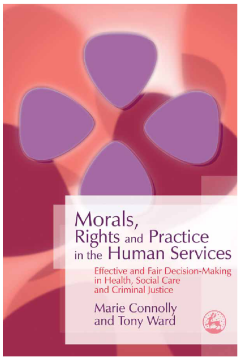
Additional Information
Book Details
Abstract
Work within the human services is increasingly influenced by rights-based thinking, and this book offers advice for the practitioner on how to translate abstract rights theory into their everyday practice.
The book outlines the theory that underpins human rights and outlines the ethical debates and dilemmas that frequently surround them. It also provides a practical model that outlines how to embed human rights theory within practice and the professional decision-making process. Drawing extensively on real-life case examples, the book includes chapters on rights-based work with different client groups including offenders, people with intellectual disabilities, immigrants and refugees, and children and families.
This important book will be a useful source of guidance and advice for professionals working across the human services, including those in social care, health and justice settings.
An interesting, persuasive book about the way we ought to think about the ways we treat others. Let me recommend Morals, Rights and Practice in the Human Services to anybody with an interest in inter-personal relations, both in and out of the context of the human services, as well as to anybody attracted to a novel way of approaching these relations.
Metapsychology Online
Overall the book provides acknowledgement and thorough analyses of the complexities of human rights issues. In particular there is fair and balanced analysis of situations of competing rights, without giving prescriptive answers to ethical dilemmas... this book will be of interest to social work educators, and probably more advanced students, and practitioners particularly in the areas of child protection and criminal justice.
Aotearoa New Zealand Social Work
Marie Connolly, PhD, DipSocWk, has been Associate Professor and Director at the Te Awatea Violence Research Centre at the University of Canterbury, Christchurch, New Zealand. She is currently Chief Social Worker within the New Zealand government. She has published extensively in her area of scholarship, and has written six related books, including Culture and Child Protection: Reflexive Responses (Jessica Kingsley Publishers). She has a social work background in statutory child welfare. Tony Ward, PhD, DipClinPsyc, is Professor of Clinical Psychology at Victoria University of Wellington, New Zealand. He has worked as a clinical psychologist and an academic in a number of settings, and has a small private practice. He has written over 200 publications, including ten books, primarily in the area of forensic psychology.
The book would be useful for students and practitioners looking to explore practice issues from an international perspective and different societal responses and structures to similar problems, such as the use of corporal punishment. The structure and lay out of the chapters is such that it allows the reader to dip in and out depending on their particular interests. It would be a useful addition to any library.
The Higher Education Academy Social Policy and Social Work Subject Centre
The strength of the book for practitioners and academics involved with the criminal justice system is in how it highlights the risks of populist punitive penal responses becoming vehicles for oppression and the denial of human rights.
The Howard Journal
This book provides a synthesis of human rights theory and human services practice and offers a rights-based model to aid professional decision-making and practice... This important interdisciplinary resource is an essential tool for professionals working across the human services, including those in social care, health and justice settings.
childRIGHT
Table of Contents
| Section Title | Page | Action | Price |
|---|---|---|---|
| List of Acronyms i-v | |||
| Preface v | |||
| I WOMEN AND THE TRANSPORT OF WATER | |||
| A Background 1 | |||
| B Why Improve Water Supplies? 3 | |||
| C Transport and Development 5 | |||
| D The Division of Labour 6 | |||
| E The Consequences of Having to Carry Water 9 | |||
| 1 Health effects 9 | |||
| 2 Economic effects 10 | |||
| 3 Social effects 12 | |||
| F Alternative Technologies 13 | |||
| 1 Carrying aids 14 | |||
| 2 Wheelbarrows and handcarts 17 | |||
| 3 Animal transport 18 | |||
| 4 Others 19 | |||
| 5 Introducing new technologies 21 | |||
| II KENYA: THE PROBLEMS AND SOME SOLUTIONS | |||
| A Water Supply in Kenya 23 | |||
| B The Workload 25 | |||
| C Carrying Methods 28 | |||
| D Case Studies in Kenya 32 | |||
| 1 Kamajene Farmers' Centre 32 | |||
| 2 Action Aid - Kibwezi Region 34 | |||
| 3 Utooni Development Project 36 | |||
| 4 Discussion 39 | |||
| E Donkeys in Development 42 | |||
| III CONCLUSIONS | |||
| A General Conclusions 44 | |||
| B Conclusions on Kenya 44 |
